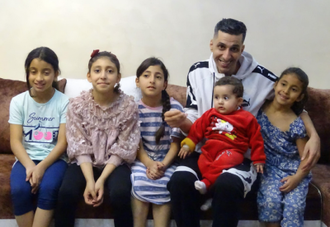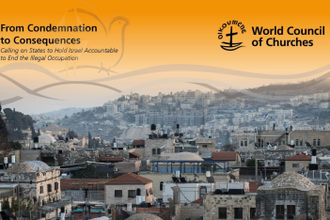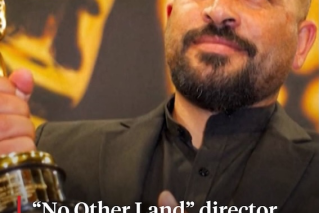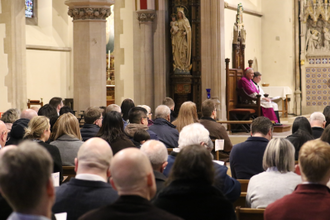Chokehold: Dispossession, Domination, and Systematic Disintegration of the Palestinian People

Rajabi with his five daughters at their home, two days before demolition.
Maryknoll Sister Susan Nchubiri, Ecumenical Accompanier in Jerusalem writes:
According to a report by B'Tselem, in 1967, Israel annexed 7,000 hectares of the West Bank land to the municipal borders of Jerusalem and applied the Israeli law there. However, the residents of the annexed area were not given Israeli citizenship but a 'permanent resident permit,' legally meant for immigrants who choose to reside in another country other than their homeland. However, I must note that most of the Palestinians living in the occupied territories have no other homeland. In addition, it is rare for citizenship to be revoked, but the government can cancel a resident permit at any time if, for instance, the permit holder fails to observe the law of the land.
Israel's illegal annexation and occupation of the Palestinian territories continues to grow and intensify through discriminatory land laws and the expansion of settlements, separation barriers (walls and fences), and checkpoints that restrict movement, including access to education, livelihood, worship, medical care, and freedom of association. The occupation is in contravention of the UN Security Council Resolution 242 of November 22, 1967.
The Coalition Center for Palestinian Rights in Jerusalem reports that the Israeli government has taken 88% of the land in Jerusalem, leaving only 12% to the Palestinians. Moreover, even this 12% is under threat of confiscation through the use of absentee law, restrictive building laws, the Master Plan (Jerusalem Urban Planning), development plans, and green zoning. Without any land reserves, the Palestinians are forced to live in overcrowded neighborhoods and make "illegal" adjustments to their homes to accommodate their growing families. However, on the other hand, the Israeli authorities encourage Israeli settlers to move into Palestinian neighbourhoods. For instance, there are about 75 settler units in the Muslim and Christian quarters of the Old City of Jerusalem, while no Muslims or Christians are allowed to live in the Jewish quarter of this Old City.
Here I will name a few of the violations of the Palestinians' human rights:
- Absentee Property Law of 1950 is used as the basis for the forceful transfer of Palestinian property to Israelis. Absentee law and the Legal and Administrative Matters Law of 1970 grant Israelis rights to claim properties they allege were owned by Jews before 1948. However, the Palestinians do not have similar rights or claims. (Please see the UNHRC report of February 2021).
- Discriminatory urban planning and land confiscation through the Master Plan
- Restrictive, substandard, and inadequate access to education for Palestinian children in East Jerusalem
- Demographic control through restrictive residency status - if a Palestinian with a Jerusalem ID lives in another city for six months, even in the West Bank, they risk losing their property and residency status.
The Law of Return is discriminatory as it applies to Jews only. Therefore, Palestinian refugees cannot return.
Let me share with you how the Israeli authorities use the Master Plan, an urban planning and land confiscation tool, to impact the Palestinians in East Jerusalem negatively. Israeli laws make it difficult for Palestinians in the occupied Palestinian territories (oPt) to obtain construction (including renovation) permits. On the other hand, Israeli extremist organizations such as Ateret Cohanim and Amana have no problem getting these permits. Therefore, many Palestinians add to their houses to accommodate their growing families without the needed permits, which is deemed illegal. Rajabi, whose house was recently demolished, shared that another family in the neighbourhood had been forced to sell their property to a settler three years ago. The family had legally tried to remove the demolition orders and get a building permit but were unsuccessful; therefore, having no alternative except to continue the very costly court battle, the family sold the house to a settler. This forceful property transfer to an Israeli settler canceled the demolition order. The Israeli settler is comfortably living there with his family. It clearly supports what the Palestinians describe as the Israelization of Jerusalem. This is a strategy through which Palestinians are forced to transfer property to Israelis. The issue at hand is not the house itself but who builds and owns the house. Israel claims Jerusalem as the capital of Israel (read about Israel's nation-state law that states "the right to exercise national self-determination" in Israel is "unique to the Jewish people").
Israeli authorities use house demolitions as one way to choke the Palestinians. We visited a family in Silwan whose house was demolished on May 10, 2022. Our team had visited the family on May 8 and learned that one family member had received a phone call from the Israeli police saying the house would be demolished any day soon. In less than ten days, the house was demolished. The family had been fighting against the confiscation of their property since 2000 when they were ordered to demolish the house. The building housed five brothers and their families. A total of 35 people lived there. They had added apartments to the building "illegally" because they had severally applied for construction permits but never received permits. For this "illegal" construction, the family had been paying a monthly fine of 4,000 Shekels(NIS). The ground floor was a source of income for the family because it was rented as a medical centre. The medical centre served several thousand people in the neighbourhood. Therefore, the loss of the property has left the whole community without medical access and 35 people, including children, are homeless and traumatized.
Mr Rajabi, one of the brothers, shared that during this 22-year court battle to retain their property, the family has paid over 700,000NIS and the equivalent of USD 217,000 in fines for "illegal" construction and lawyer fees. One part of the house was not under demolition order, but it was significantly damaged. Though some of the family members are still living there, it is dangerously unstable and unsuitable for habitation. They also said the family would be issued a demolition bill between 200,000 to 250,000(NIS)/ or USD 62,000 to 77,400. If the family does not pay, they fear the Israeli authorities will use this to take the remaining piece of property. Rajabi has five beautiful little girls that were in school when their house was demolished. When they returned home, they were horrified. They did not understand why their home was a mound of rubble. Rajabi kept asking, "how can I teach them peace?" He also said, "the Israeli authorities and the settlers do not want to see happy Palestinians." He was referring to the destroyed family swimming pool, which was not part of the demolition order but was knocked down in the process. The police gave the demolition alert on the first day of Eid al Fitr, which is an extraordinarily important day for Muslims where they celebrate the end of Ramadan. It is important to note that a demolition alert does not indicate a day or time when it would happen. It could take place a few hours, days, or weeks after the issuance.
Rajabi said he was not allowed to speak in the Supreme Court, which determined his case. He further said, "the judge who heard my case is a settler living in the Efrat settlement in Bethlehem. So, how could he rule favorably for a Palestinian?"
Rajabi works at an Israeli shop and says he does not have any animosity toward the Jewish Israeli people, but he opposes the cruel policies of Israel. "Israel is against my children." It labels Palestinians as terrorists. "We are not terrorists," he continued, "They destroy our humanity." He compared how the international community has responded to the Ukrainian plight and how it has responded to the Palestinians' pleas over the years. Unfortunately, he said, "the only thing Israel gets for the oppression and cruelty to the Palestinians is a rebuke or a United Nations Security Council Resolution. Israel does not respect resolutions. The international community's words are hollow. The world must stop the talk and start to work."
As of 2013, the State of Israel had been condemned 45 times in resolutions by the United Nations Security Council. List of United Nations resolutions concerning Israel. This shows that Israel will not listen to any rebukes and will continue to violate international human rights law in treating the Palestinian population. The world must stop the talk and start the work.
When Rajabi's house was being demolished, Silwan felt under siege. For several hours the Israeli police blocked off all access to the area and escorted three bulldozers to Rajabi's home. When asked how many police were there, he said there were far too many to count. In addition, the people doing the demolition acted cruelly toward the family. The police guarded them as they smashed items the family could have salvaged. What was the reason for this?
Rajabi has lived for many years with policies and daily routines that show Israeli authorities treating his family and other Palestinians as second-class people and unwanted neighbours. "They want us to go," Fares said, "we don't." So he and his family stay on their land. "We ask to be left alone, to retain our property, to be given permits to renovate when necessary, and to be left free to go to work without harassment and detentions."
Rajabi asked us to use his name when telling his family's story. He wants their story told. He wants to tell the story himself. He wants to present his case to the International Criminal Court (ICC) because the courts in Israel have failed him and the Palestinian people. But if going to the ICC is impossible, then the task is ours. I join Rajabi in urging the international civil community and their governments to "…stop the talk and start the work." Issuing statements of condemnation needs to be accompanied by actions that will pressure the Israeli government to amend the chokingly oppressive and discriminatory policies.
The Rajabi family is one of the thousands of Palestinian families subjected to this inhumane and unjust practice. They have property ownership documents, but the courts will not honor them. "All the Israeli government wants is for us to go out of Jerusalem. But where must we go?" Rajabi asks. For instance, in Silwan, where Rajabi and his relatives live, there are 87 demolition orders affecting about 1500 people in extended families. Where will these families go? Where is justice for these families? The following statistics from the United Nations Office for the Coordination of Humanitarian Affairs(UNOCHA) demolitions demonstrate how widespread the demolitions and evictions are for the Palestinians in the occupied territories.
Israel's illegal occupation of Palestinian territories, its cruel and discriminatory treatment of the Palestinians, and denial of human rights must end. Israel must stop using "security" as an excuse to oppress people. This is the work you and I must start to do.
Dear God, there is a great displacement of people caused by unjust and inhumane systems.
We pray for the refugees, the internally displaced persons,
and those who are illegally being dispossessed
of their land and property.
Strengthen their resilience and their hope so that they do not despair.
We ask this through Christ our brother.
Amen
Susan Nchubiri is a Maryknoll Sister and a Master of Global Affairs student at the University of Notre Dame in Indiana, specializing in International Peace Studies. She is currently serving as an Ecumenical Accompanier with the World Council of Churches' EAPPI program. She previously worked as a community organizer in Haiti where she founded 2 self-help women's groups, a micro-credit co-operative, a community garden and goat-raising project for a youth group. Before that she has worked as a campus minister and pastoral care giver to students, migrant workers and prisoners in Hong Kong. Susan had also worked in campus ministry in Chicago and volunteered weekly at the Cook County Juvenile Detention Center. She was program director at Euphrasia Women Refuge Center and at Maria House Imani Projects in Nairobi Kenya where she worked hand in hand with the social workers and instructors to support vulnerable women and children.
If you would like to learn more about the EAPPI program, please visit their website.


















